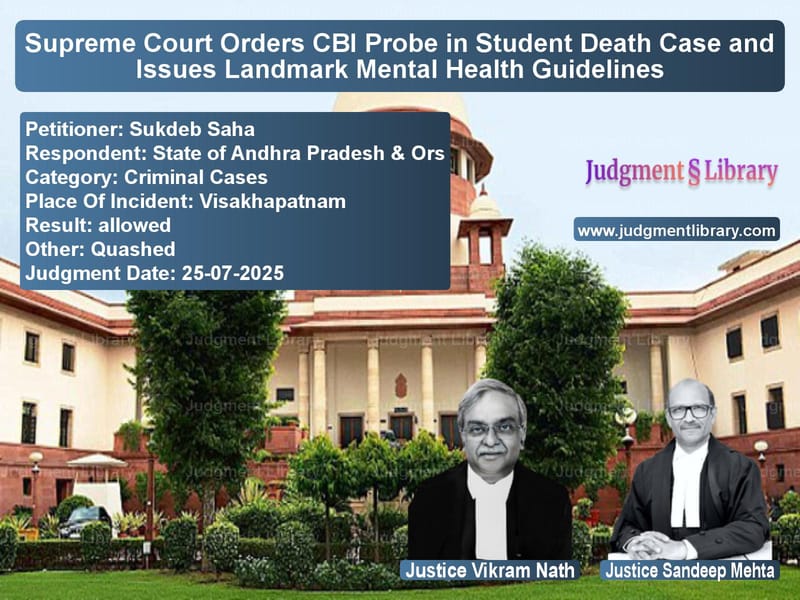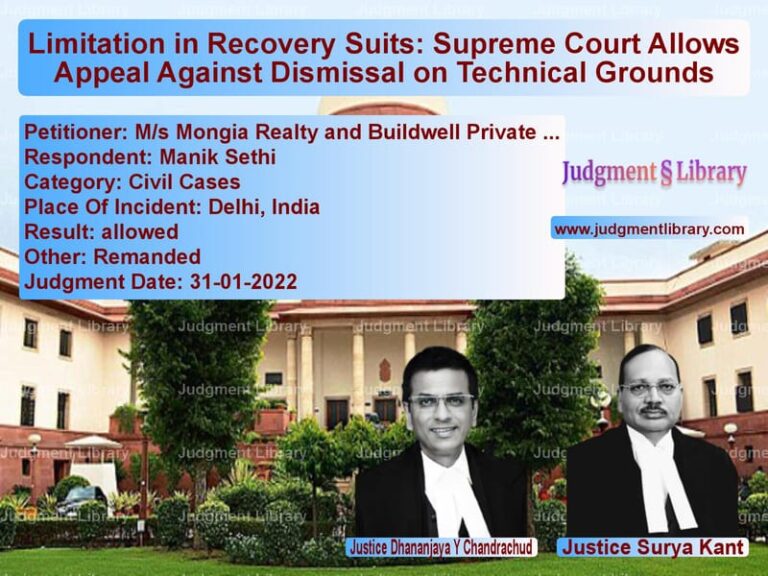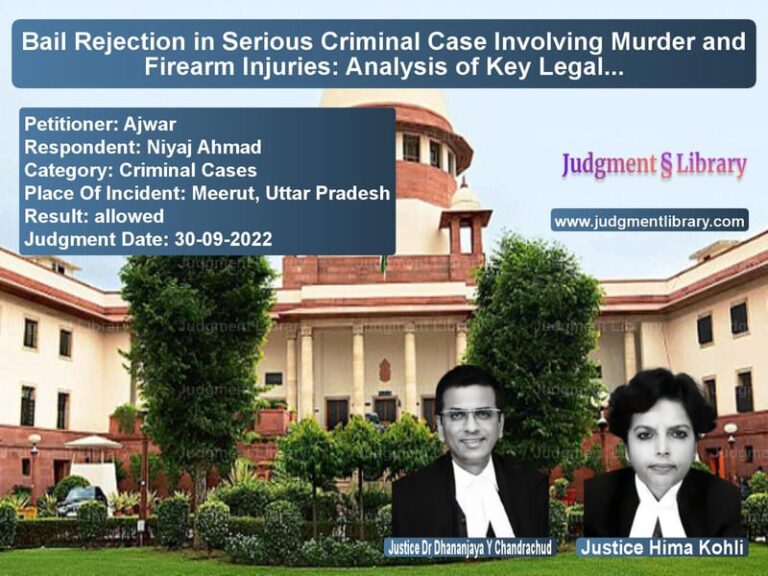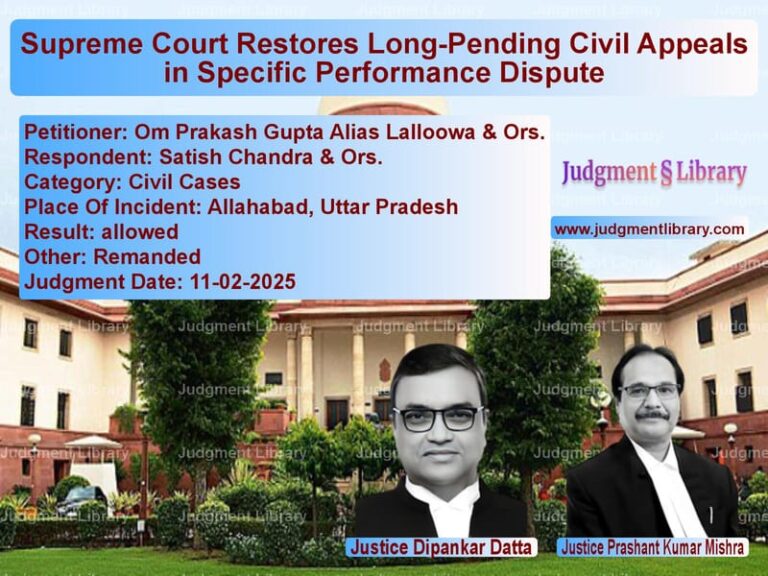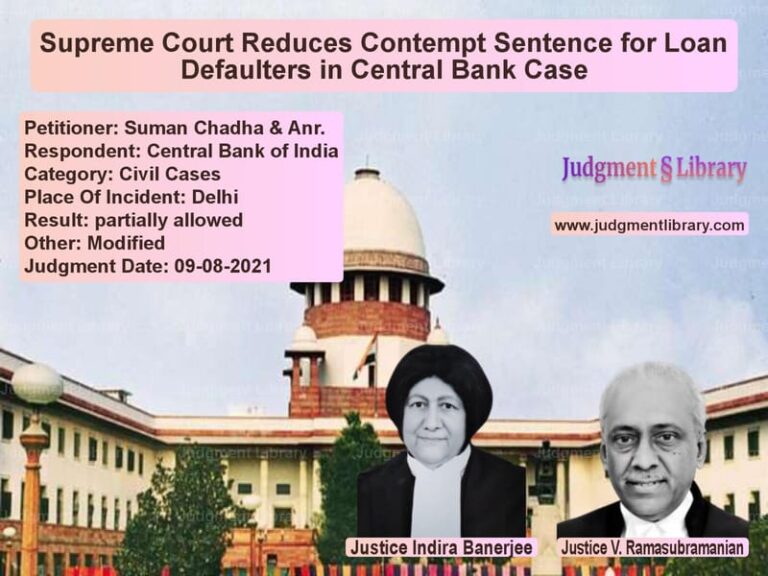Supreme Court Orders CBI Probe in Student Death Case and Issues Landmark Mental Health Guidelines
In a groundbreaking judgment that addresses both a tragic individual case and a nationwide crisis, the Supreme Court of India has taken historic steps to protect student mental health while ensuring justice for a grieving father. The case involved Sukdeb Saha, whose 17-year-old daughter died under mysterious circumstances while preparing for NEET examinations in Visakhapatnam. The Court’s ruling not only transfers the investigation to the CBI but also establishes comprehensive mental health safeguards for educational institutions across India, recognizing the alarming epidemic of student suicides that has claimed thousands of young lives.
A Father’s Quest for Truth
The tragedy began when Sukdeb Saha’s daughter moved from West Bengal to Visakhapatnam in May 2022 to prepare for the NEET examination at Aakash Byju’s Institute. She stayed at Sadhana Ladies Hostel, recommended by the coaching institute. On July 14, 2023, the appellant received a late-night call informing him that his daughter had fallen from the third floor of the hostel building. When he reached the hospital the next day, he found his daughter unconscious on ventilator support. Despite being shifted to another hospital for better treatment, the young girl passed away on July 16, 2023. What followed was a father’s relentless pursuit of truth through multiple legal petitions, challenging what he believed was a flawed investigation that hastily concluded his daughter’s death was suicide.
The Legal Battle Intensifies
The appellant filed multiple writ petitions before the Andhra Pradesh High Court, seeking various reliefs including the appointment of a Court Commissioner to collect evidence and ultimately requesting transfer of the investigation to the CBI. The High Court appointed an Advocate Commissioner to collect CCTV footage but ultimately rejected the plea for CBI investigation, stating that since there were two FIRs registered in different states, the prayer for transfer was beyond the Court’s jurisdiction. This led to the appeal before the Supreme Court, where both sides presented compelling arguments.
Read also: https://judgmentlibrary.com/cheque-bounce-case-jurisdiction-supreme-court-clarifies-legal-position/
The Arguments Presented
The appellant’s counsel vehemently argued that “the investigation into the unnatural and suspicious death of the appellant’s daughter, Ms. X, was conducted in a manifestly arbitrary and perfunctory manner by the local police authorities.” He pointed to critical evidence gaps, stating that “the CCTV footage from Sadhana Hostel shows a girl in salwar/trousers going upstairs toward the terrace at approximately 10:25 pm on 14th July, 2023, whereas the footage from Sanghvi Lamination Shop from 14th July, 2023, at 10:46 pm, shows a girl in blue half pants and a T-shirt lying down on the floor.” This glaring discrepancy in apparel indicated that the girl going upstairs might not have been the appellant’s daughter.
The appellant also highlighted medical irregularities, noting that “in the autopsy report dated 17th July, 2023, under column D (Abdomen), there is explicit mention of a ‘suspicious smell’ in the stomach contents of the deceased.” Despite this finding, critical forensic reports were withheld. Most disturbingly, “the formation and functioning of the Medical Committee constituted to investigate potential medical negligence suffer from grave irregularities” as the autopsy doctor served multiple conflicting roles.
The respondents, however, defended the investigation, arguing that “investigation into the unfortunate death of the appellant’s daughter, Ms. X, has been conducted diligently and in accordance with the law by the local police authorities.” They maintained that “all necessary medical treatment was rendered to the deceased in line with standard medical protocols” and that “the appellant is attempting to attribute vicarious liability to Aakash Institute without any legal or factual basis.”
The Court’s Scrutiny of Evidence
The Supreme Court conducted a meticulous examination of the evidence and found multiple concerning aspects that pointed to investigative failures. The Court noted that “the attempt of the respondents to paint the unfortunate incident as one of suicide, relying upon vague references to the deceased being ‘agitated’ on the evening of 14th July, 2023, is wholly unsubstantiated.” The Court observed that “if this was truly a case of suicide, it is inexplicable that no suicide note was recovered, no psychological history was documented, and no statements of her friends, classmates or roommates were recorded to establish any alleged suicidal tendencies.”
The Court found the clothing discrepancy in CCTV footage particularly alarming, stating that “this fundamental inconsistency has not been reconciled by the Investigating Officers. No attempt whatsoever has been made to verify whether the girl who was seen going upstairs was none other than the deceased.” Medical evidence also raised serious questions, as the Court noted that “the presence of semi-digested food in the stomach, as noted in the autopsy report, is irreconcilable with the claim that the deceased was on continuous ventilatory support from the early hours of 15th July, 2023.”
The Compelling Factors for CBI Transfer
The Court identified multiple compelling factors that necessitated CBI intervention. It expressed grave concern about “the consolidation of three critical forensic roles with the same medical officer who functioned simultaneously as the autopsy surgeon while conducting post-mortem examination, chemical analyst for forensic/DNA examination and a member of the post-incident internal inquiry committee.” The Court found that “each of these roles, by the very nature of their functions, require institutional independence, objectivity, and professional detachment.”
Perhaps most damaging was the “premature destruction of the deceased’s viscera, ordinarily the cornerstone of any postmortem DNA comparison, before completing the court-mandated investigation,” which the Court found had “irrevocably compromised the proceedings.” The Court concluded that “the foregoing facts and circumstances, including the glaring inconsistencies in the medical records, the autopsy report indicating suspicious contents of stomach despite the deceased allegedly being on ventilatory support, the unexplained lapses in seizure and preservation of critical forensic evidence, and the contradictory statements by authorities, collectively highlight a case of exceptional complexity and concern.”
Addressing the National Mental Health Crisis
Moving beyond the individual case, the Supreme Court addressed what it termed a “deepening crisis” of student suicides in India. The Court noted disturbing statistics that “India recorded 1,70,924 reported suicide cases in the year 2022, of which 7.6%, approximately 13,044, were student suicides. Notably, 2,248 of these deaths were attributed directly to failure in examinations.” The Court observed that “the number of suicides among students in the last two decades has increased from 5,425 in 2001 to 13,044 in 2022.”
The Court philosophically reflected that “contrary to these ideals, the contemporary academic framework, particularly in the context of competitive examination systems, often subjects students to relentless psychological pressure. The very soul of education appears to have been distorted.” It noted that “in this paradigm, life becomes a series of tests, and failure is seen not as a part of growth but as a devastating end.”
Landmark Mental Health Guidelines
In what may become the Vishaka Guidelines equivalent for student mental health, the Supreme Court issued comprehensive directives to all educational institutions. The Court declared that “mental health is an integral component of the right to life under Article 21 of the Constitution of India” and established that “the right to life does not mean mere animal existence, but a life of dignity, autonomy, and well-being.”
The guidelines mandate that all educational institutions must adopt mental health policies, appoint qualified counselors, maintain optimal student-to-counsellor ratios, and establish confidential reporting mechanisms. Specifically, the Court directed that “all educational institutions, more particularly the coaching institutes/centres, shall, as far as possible, refrain from engaging in batch segregation based on academic performance, public shaming, or assignment of academic targets disproportionate to students’ capacities.”
The Court also addressed physical safety measures, requiring that “all residential-based institutions shall install tamper-proof ceiling fans or equivalent safety devices, and shall restrict access to rooftops, balconies, and other high-risk areas, in order to deter impulsive acts of self-harm.” Special attention was given to coaching hubs like Kota, Jaipur, and Visakhapatnam where student suicide rates are disproportionately high.
A Watersmoment Moment for Student Welfare
The Supreme Court’s judgment represents a watershed moment in Indian jurisprudence, blending individual justice with systemic reform. By transferring the investigation to CBI, the Court acknowledged that “the investigation into the unnatural death of Ms. X has to be entrusted to the CBI. Such a transfer is necessary not only to ensure a comprehensive and impartial investigation but also to restore public confidence and address the legitimate concerns of the bereaved family.”
Simultaneously, by issuing comprehensive mental health guidelines, the Court has created a protective framework that could potentially save thousands of young lives. The judgment recognizes that student suicides are not merely personal tragedies but systemic failures that demand institutional accountability and structural reforms. This dual approach of addressing both immediate justice and long-term prevention sets a powerful precedent for how courts can respond to complex social issues that combine individual rights with broader public health concerns.
Petitioner Name: Sukdeb Saha.Respondent Name: State of Andhra Pradesh & Ors.Judgment By: Justice Vikram Nath, Justice Sandeep Mehta.Place Of Incident: Visakhapatnam.Judgment Date: 25-07-2025.Result: allowed.
Don’t miss out on the full details! Download the complete judgment in PDF format below and gain valuable insights instantly!
Download Judgment: sukdeb-saha-vs-state-of-andhra-prad-supreme-court-of-india-judgment-dated-25-07-2025.pdf
Directly Download Judgment: Directly download this Judgment
See all petitions in Suicide Cases
See all petitions in Custodial Deaths and Police Misconduct
See all petitions in Medical Malpractice
See all petitions in Education Related Cases
See all petitions in Other Cases
See all petitions in Judgment by Vikram Nath
See all petitions in Judgment by Sandeep Mehta
See all petitions in allowed
See all petitions in Quashed
See all petitions in supreme court of India judgments July 2025
See all petitions in 2025 judgments
See all posts in Criminal Cases Category
See all allowed petitions in Criminal Cases Category
See all Dismissed petitions in Criminal Cases Category
See all partially allowed petitions in Criminal Cases Category

